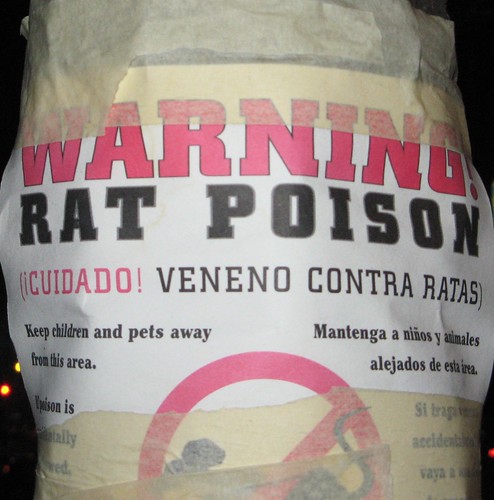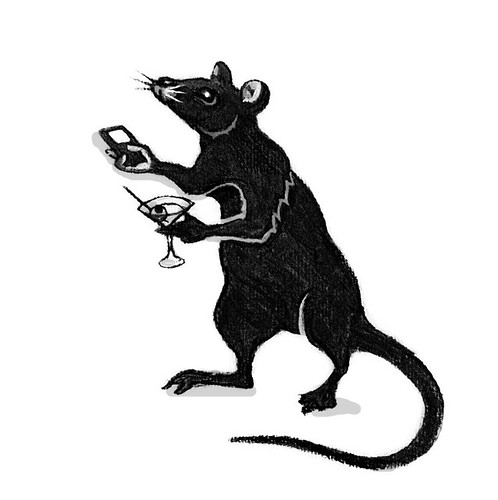Just a few years ago, in the face of a widespread rodent infestation, a concerned citizen offered the suggestion that New York would do well to appoint a “Rat Czar.” City Hall firmly said no. The idea was, indeed, preposterous. Especially when you consider that the rats themselves had already filled that position.
The Rat Czar is, by all accounts, a shadowy figure, whereabouts unknown. My calls were not returned directly. But the Czar’s own Lieutenant of the East Village, a rat of great cunning, agreed to speak on condition of anonymity:
“I apologize for the security precautions,” he said as we sat down, “but you see, someone is trying to poison me.”
“Oh, how awful,” I exclaimed. “Any idea who’s behind it?”
“No,” he huffed. “It was but a single, cowardly act.”
“I do thank you for taking the time,” I said as he preened away some rancid grease from his foreleg. “Your development projects are truly impressive. I was just passing along First Street near Second Avenue.”
“Lovely, isn’t it?” he smiled.
“Rats by the dozens!” I marveled.
“By the hundreds,” he gloated, and fixed me with his beady eyes. “Our underground tunnels are the very envy of ratted cities like London, Paris, Madrid …”
“Tell me then, if you will, about the Rat Czar,” I said, getting down to business.
He was evasive. “I’m afraid I’m not at liberty, Mr. Milk. I can, however, speak for the Rat Czar and all of us rats in all five boroughs: the important thing is winning. Do you realize there are 10 rats to every New Yorker?”
“I thought it was seven,” I said.
“I don’t know where you get your figures from,” he sniffed.
“How do you stand with City Hall?”
“Hey, I love those guys!” he said, laughing giddily.
“Can you expand on that?”
“Well,” he figured, “what with an oversaturation of restaurants and bars, lax sanitation, the indoor smoking ban…”
“But rats don’t smoke,” I countered.
“That’s true, we don’t. But your bar patrons do, and they’re always staggering around dropping pizza crusts. Man, you’ve got to love this town!”
“So what you’re really saying,” I offered, “is that we careless humans are actually making life better and better for the rat of today.”
“That’s right,” he assured me. “I mean, hey, take a look around. It’s the rats who are winning in this terrible downturn. And that’s especially true in the good old East Village.”
“But,” I interjected, “what if they try to eradicate you?”
His whiskers bristled. “Oh, how I hate that word! Sure, there’s some health-nuts who think they can push us around…”
“They do have a point,” I asserted. “Rats and rodents. Don’t they spread disease? Like salmonella? Typhus? And rabies?”
“Look who’s talking!” the rat sneered. “You spread the flu. And STDs! And what about tuberculosis?”
I informed him that tuberculosis had been eradicated.
“Dammit! There’s that word again!” He then opened his hands. “Mr. Milk, do you know why I agreed to this interview?”
“No,” I told him. “Why?”
“Because I had hoped it would bring us together. To a place where rats and people can live as one, in harmony. After all,” he said, peering down the fur of his nose, “it’s apparent you have no other choice. But ah! Look at the clock. Time has gotten away from me.”
His last assertion left me appalled and stunned. I sat there agape until I thought to inquire, “And what time would that be, sir?”
He brightened. “Dinner time! Care to join me?”
I was already backing out the door. “So sorry,” I said, excusing myself. “Bon appétit!”





